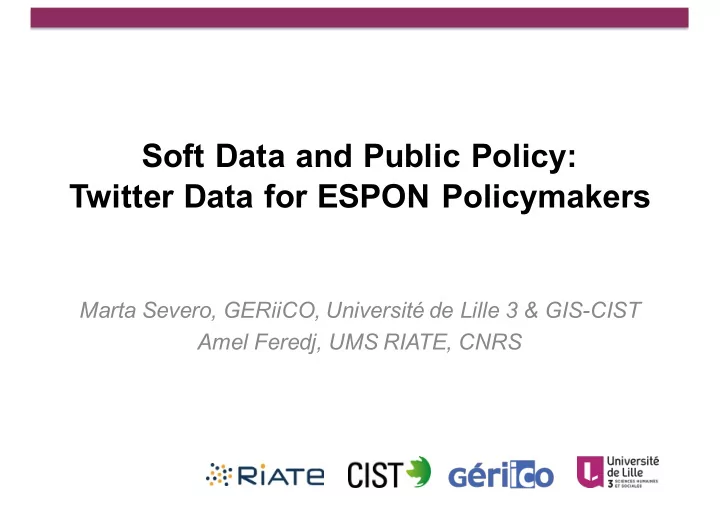

Soft Data and Public Policy: Twitter Data for ESPON Policymakers Marta Severo, GERiiCO, Université de Lille 3 & GIS-CIST Amel Feredj, UMS RIATE, CNRS
1. Applied research: The ESPON project “Analytical Tools based on Big Data” 2. From the research to the field: interviews of ESPON policy makers
The starting point ESPON Feasibility Study on Analytical Tools based on Big Data • Partners: Université Paris Diderot, Université de Lille 3, University of Amsterdam, CNRS • Coordinator : M. Severo • Participants: N. Douay, T. Giraud, C. Grasland, M. Nielsen, H. Pecout, R. Rogers, M. Texier
The ESPON Programme European Territorial Observatory Network Mission statement : grow the provision and policy use of pan-European, comparable, systematic and reliable territorial evidence to ease policy making.
The objective Assessing the possibility to use social media data along with official data in territorial analysis ?
How and to what extent ? • “explore innovative possibilities to analyse open source data from the Web, such as social media (Facebook, Google+, Twitter, blogs, etc.)” • “bring new and interesting opportunities to support policy development”.
The promises of “New” Data Traditional data “New” data Too long delay of publication Shorter delay of publication useful for action Insufficient coverage of some Coverage of new topics of interest topics of interest for territorial cohesion The focus of official statistics on Availability of data at new count data related to NUTS units geographical levels The top-down definition of data of Bottom-up elaboration & tailor- interest made information
Deliverables – Assess which types of data – Identify how new data can be implemented in practice and integrated into ESPON analysis by proposing a practical methodology – Provide 2 practical examples
Real-time follow up of city brand and governance on Twitter communication Tweets including Tweets geo- Tweets of city’s the name of the tagged in the influencers city metropolitan areas International Elements of city Real-time follow up recognition of the branding at local of the governance city level of the city Sample: Marseille, Bologna, Edinburgh, Brussels Period: 2 June – 29 June 2014
Issue 1: variety of uses of Twitter
Issue 2: small amount of geotagged tweets C. Gerlitz et B. Rieder, 2013
1) Tweets about the city: international recognition of the city A week of geo-tagged tweets
1) Tweets about the city: international recognition of the city Tweets and geo-tagged tweets mentioning the four cities from the 21 st May and the 6 th July
1) Tweets about the city: international recognition of the city
1) Tweets about the city: international recognition of the city
1) Tweets about the city: international recognition of the city
1) Tweets about the city: international recognition of the city
1) Tweets about the city: international recognition of the city Level of internationalisation : Geographical distribution of over-quotations of the four cities at European level
1) Tweets about the city: international recognition of the city
1) Tweets about the city: international recognition of the city
1) Tweets about the city: international recognition of the city
1) Tweets about the city: international recognition of the city
1) Tweets about the city: the city brand Distribution of hashtag in tweets mentioning Bologna between the 2 nd and the 29 th June 2014
1) Tweets about the city: the city brand Bologna Marseille
2) Tweets inside the city: local follow up Geographical distribution of tweets inside the city and of tweets per capita
3) Influencers of the city: real-time follow up 3) Influencers of the city: real-time follow up
3) Influencers of the city: real-time follow up
3) Influencers of the city: real-time follow up Top hashtags (excluding sport) per month in tweets of Bologna’s influencers
3) Influencers of the city: real-time follow up How influencers from Bologna speak about the crisis and austerity ?
3. From the research to the field
Research protocol • 9 semi-directif elite interviews • Questionnaire: – Actual use of soft data – Perception of soft data
Results 1. Penetration trends of Internet data in public policies 2. Need and supply of the use of Internet data 3. Perception of the Internet data by institutions 4. Perspectives for the use of Internet data in the decision-making process
Thank you for your attention ! amel.feredj@ums-riate.fr
Recommend
More recommend